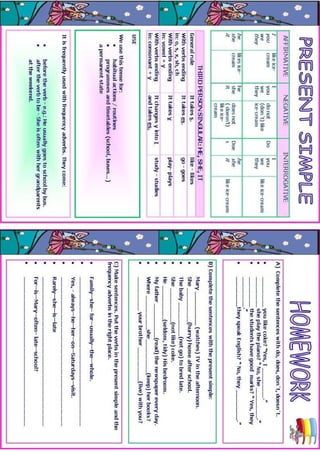Present simple +_homework
- 2. AFFIRMATIVE NEGATIVE INTERROGATIVE I you we they like ice- cream I you we they do not(don´t) like ice-cream Do I you we they like ice-cream he she it likes ice- cream he she it does not ( doesn’t) like ice-cream Does he she it like ice-cream THIRD PERSON SINGULAR: HE, SHE, IT General rule It takes s. like - likes With verbs ending in: o, s, x, sh, ch It takes es. go - goes With verbs ending in: vowel + y It takes y play- plays With verbs ending in: consonant + y It changes y into I and takes es. study - studies USE We use this tense for: • habitual actions / routines • programmes and timetables (school, buses…) It is frequently used with frequency adverbs. They come: • before the verb - e.g.: He usually goes to school by bus. • after the verb to be - She is often with her grandparents at the weekend.
- 3. B) Complete the sentences with the present simple:  • Mary __________ (watches) TV in the afternoon. • She __________(hurry) home after school. • The baby __________(not go) to bred late. • She __________(not like) coke. • He __________(seldom, tidy) His bedroom. • My father __________(read) the newspaper every day. • Where __________she__________(keep) her books? • __________ your brother __________(live) with you? A) Complete the sentences with do, does, don´t, doesn´t.  • _________ you like coke? “Yes, I _________.” • _________ she play the piano? “ No, she _________.” • _________ the students have good marks? “ Yes, they _________.” • _________they speak English? “ No, they _________.” C) Make sentences. Put the verbs in the present simple and the frequency adverbs in the right place.  • Family—she– for—usually—the—whole. • ____________________________________________ • Yes, - always—he—her—on—Saturdays—visit. • ____________________________________________ • Rarely—she—is—late • ____________________________________________ • For—is—Mary—often– late—school?



